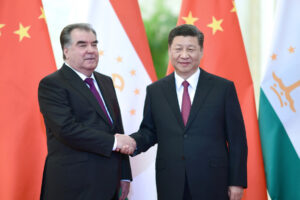Indonesia lowered its 2030 target for carbon emissions from the power sector and excluded captive coal-fired electricity plants from a draft roadmap released Wednesday for U.S. $20 billion in financing from rich nations to wean off coal.
The Southeast Asian nation said it lowered its carbon emissions target because it would be “extremely difficult” to achieve, but set a higher renewable energy generation goal in the draft plan that lays out how funds from the Just Energy Transition Partnership (JETP) will be spent.
The draft plan, called the Comprehensive Investment and Policy Plan (CIPP), will be evaluated and revised regularly, the document says.
“The CIPP is a living document that will be updated annually to reflect the latest global economic condition and domestic development priorities,” said Edo Mahendra, head of the JETP secretariat in Indonesia.
The draft plan outlines a strategy to retire coal-fired power plants, ramp up renewable energy sources and modernize the electricity grid. It also aims to ensure a fair and inclusive transition that minimizes the social and economic impacts of the shift to clean energy.
Under the plan, released for public review, Indonesia aims to cut its power sector carbon emissions to 250 million metric tons by 2030, down from the 290 million tons it agreed to last November.
The Southeast Asian country also agreed to accelerate the deployment of renewable energy so that it comprises at least 34% of all electricity generation by 2030, up from the 34% it agreed to last year. Additionally, it set a goal of net zero emissions by 2050.
Indonesia relies on coal for electricity generation, which provides more than 60% of the country’s power supply. Coal is a major source of income and employment for many Indonesians.
The JETP was announced at the G20 summit in Bali in November 2022. An American official said back then that it was “the single largest country specific climate investment partnership.” It will be funded by grants and loans from wealthy countries including Group of Seven nations.
Led by the United States and Japan, the JETP was signed by Canada, Denmark, the European Union, France, Germany, Italy, Norway and the United Kingdom.
The two-week public review of the plan began Wednesday and citizens can submit their inputs through the JETP website.
The final version of the plan is expected to be launched in Indonesia before the world’s biggest diplomatic event on climate change – the Conference of Parties (COP) 28, to be held in Dubai, from Nov. 30 to Dec. 12, the JETP secretariat said.
Captive coal-fired power plants
The reduction of carbon emissions from the on-grid power sector by 250 million metric tons “is extremely ambitious,” the draft plan document says.
“[P]eaking at 290 MT [the earlier agreed target] would be extremely difficult given existing and planned captive coal capacity,” the plan said. “We will continue to maintain the ambition that underpins the JETP Joint Statement.”
The plan left out captive power plants from its emissions target saying it was an “extremely complex” issue. Such plants generate power off the public electricity grid and are operated and used by large industries.
“Many industrial power users, such as those companies mining and processing nickel, require highly reliable, 24-hour power at a high volume. Further, these industrial operations are often located in remote and/or ecologically sensitive areas,” which are not on the public grid, the plan said.
And this “growing pipeline” of captive power plants to support the development of industrial facilities “are viewed as important to realizing the government’s industrial down-streaming strategy for economic development,” the draft plan said to explain these plants’ exclusion.
The plan identifies five priority areas for investment including developing transmission and distribution networks, retiring and phasing out coal plants, accelerating renewable energy deployment and enhancing the renewable energy value chain.
It also proposes policies to support the energy transition, such as reforming local content rules, improving procurement processes, adjusting supply-side incentives and ensuring the state-owned electricity company PLN is financially sustainable.
Grants vs loans
The draft plan said funders have identified $153.8 million as grant funding. That amount is less than 1% of the total JETP outlay.
Amid reports that Jakarta is displeased with the small percentage of grants as part of overall funding, the draft plan said Indonesia has called for global and regional philanthropic organizations to allocate grants to fund the energy transition.
“Given that many just transition initiatives have limited private returns but very high potential social returns, grants are the most appropriate form of funding support for the just transition,” the draft plan document says.
Muhammad Andri Perdana, a researcher at the Center for Economic and Law Studies (CELIOS), said developed countries should give more grants than loans because climate change is at stake.
“We worry they lack commitment to provide funds,” he told BenarNews, adding that the JETP funders should disburse funding to Indonesia quickly.
Perdana said the JETP should have involved local governments more in preparing the plan because they implement energy transition.
“Local governments don’t know about the plan even though a presidential regulation on energy transition delegates this issue to them,” he said.
He also criticized the two-week period for feedback on the draft plan as too short.
“We fear their input is incomplete or imperfect and will delay funding,” he said.
Bhima Yudhistira, the executive director at CELIOS, said the JETP should not depend on loans that would add to the state budget burden.
He suggested that the Indonesian government negotiate with the donor countries and global financial institutions to explore alternative financing schemes, including canceling some of Indonesia’s debts and taxing the profits of fossil fuel companies.
“The goal is to create more fiscal space and change the incentives that have been enjoyed by extractive and fossil companies, so that they can support energy transition instead,” Bhima said at the launch of a white paper released by Indonesian civil society organizations last week.
Additionally, Indonesia should look for alternative financing options for the energy transition, including investment from private or state-owned companies, carbon trading and green financing or funds with low interest rates, said Fahmi Radhi, an energy expert at Gadjah Mada University in Yogyakarta.
The JETP, he said, was not enough.
“We need other sources of funding that can be used,” he told BenarNews.
Source: Benar News















